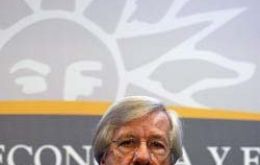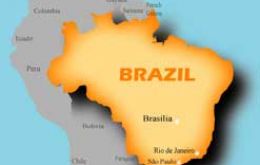MercoPress. South Atlantic News Agency
Economy
-
Wednesday, June 11th 2008 - 21:00 UTC
Obama announces windfall profits tax on oil corporations
Democratic presidential candidate Barack Obama sought to tap into US citizens' anxiety over high gasoline prices yesterday by pledging to seek a windfall profits tax on US oil companies if elected.
-
Wednesday, June 11th 2008 - 21:00 UTC
Uruguayan economy expanded 10.9% in the first quarter

Boosted by strong exports of agricultural commodities and domestic demand for communications services the Uruguayan economy expanded 10.9% in the first quarter of this year, compared to the same period a year ago.
-
Wednesday, June 11th 2008 - 21:00 UTC
Argentine consumers' expectations decline to lowest since 2003

Public opinion perception and expectations about the Argentine economy are currently going through the most serious declination since the Kirchner couple first reached government in 2003.
-
Wednesday, June 11th 2008 - 21:00 UTC
Warning that Uruguay is running out of “fiscal margin”
In spite of the good performance of the Uruguayan economy academics and former ministers have warned that given the expansion of public spending and subsidies to alleviate energy prices, the government is running out of “fiscal margin” in the event of a contingency.
-
Wednesday, June 11th 2008 - 21:00 UTC
Venezuela invites private sector with joint ventures
Venezuelan president Hugo Chávez said foreign investors have no longer “any room in the country” because they are only interested in making money and transferring earnings overseas. However, he invited private companies to joint ventures in “non strategic” areas of the economy.
-
Wednesday, June 11th 2008 - 21:00 UTC
Brazil May inflation records fastest pace in three years

Consumer prices in Brazil rose in May at the fastest pace in more than three years, 0.79%, underscoring concerns about inflation pressures in Latinamerica's largest economy.
-
Tuesday, June 10th 2008 - 21:00 UTC
Farmers' conflict: behind harsh words, dim light of hope

Argentine President Cristina Fernandez de Kirchner defended on Monday her decision to impose a controversial sliding tax system on agricultural exports and said farmers opposing her government policies are undermining the country's fight against poverty.
-
Tuesday, June 10th 2008 - 21:00 UTC
S. Korean government on the cliff over US beef imports

Thousands of protestors in downtown Seoul continued an overnight street march into early Wednesday morning, calling for the renegotiation of a United States beef import agreement despite an offer by the entire South Korean Cabinet to resign, reported the local Yonhap news agency
-
Tuesday, June 10th 2008 - 21:00 UTC
Argentina May inflation with “new system”: 0.6%

Argentina's consumer price index in May was 0.6% according to the country's Statistics and Census Institute (Indec) which has began applying a new methodology. This means that in the fives months of 2008 inflation was 4% and 9.1% in the last twelve months.
-
Tuesday, June 10th 2008 - 21:00 UTC
Brazil GDP expands 5.8% in first quarter; overheat concern
Brazil's Gross Domestic Product, GDP, expanded 5.8% in the first quarter compared to the same period a year ago, and 0.7% over the previous quarter, according to the latest release from the Brazilian Statistics and Geography Institute, IBGE.
